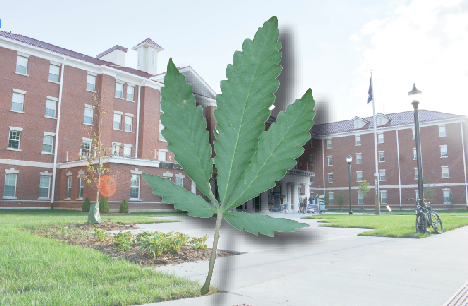Story by Collin Morris, Assistant Sports Editor
The Murray State Police Department received 14 drug complaints reported from the residential colleges between Jan. 17 and Feb. 16, according to its crime logs.
Of the 14 complaints, five resulted in drug citations for either possession of marijuana or drug paraphernalia. The remaining nine complaints led to reports from the responding officers but no criminal charges.
All 14 instances came from callers reporting the smell of marijuana in their residential colleges. Five occurred in White Residential College, four in Elizabeth, two in Hart and one each in Hester, Regents and Hollis C. Franklin.
Last year, in response to marijuana usage, Murray State began using a new system called the Marijuana eCheckup To Go for Colleges and Universities. According to the eCheckup website, it is an online program designed to prevent and intervene in marijuana use for college-aged adults, with each program being suited specifically to the individual user.
Mike Young, associate vice president for Student Affairs and retention, said the legal protocol has changed for marijuana. While possession of marijuana had previously resulted in a three-night stay in jail, it now constitutes a court date in conjunction with the campus’ requirements. Young said the campus also has its own procedural requirements for students found in possession of marijuana.
“If a student is found to be in possession of marijuana, they are typically cited by the MSU police, and therefore, those people go to court,” Young said. “Also, those students would meet with [the Housing Office staff], and we would assign a Marijuana eCheckup, as well as 10 hours of community service, then we would do a follow-up meeting after that.”
Young said the rising costs of the legal process, such as a possession of marijuana charge, could cost as much as $450 in fines and fees. Multiple instances of disciplinary action within the residential colleges can also lead to dismissal from the colleges without reimbursement of housing payments.
He said the approach to combatting marijuana on campus has evolved into more of an educational approach about the downfalls of recreational marijuana use. Additionally, campus staff has been more conscientious of mental health and its relation to drug use.
“We’re looking at it from a health and wellness perspective,” Young said. “The law is clear, but the education that is coming out is more on the lines of self-preservation. We also have the Student Intervention Team that meets on a weekly basis and deals with issues a student could have, such as, they were written up for alcohol possession and now they’re having suicidal thoughts, so we can put those pieces together, and maybe there’s a drinking problem or some depression.”
Jen Caldwell, assistant director for residential services, said her staff looks for trends in reported drug usage to see what needs to be done, including counseling.
“If that’s not their first offense as far as a policy violation, they’re going to be on our radar,” Caldwell said. “I’ll be checking with our staff to find out what is their communication with this student, to see why we’ve had no problems with this behavior, but now we have multiple issues.”
In a written response from Chief of Police James Herring, he said the Murray State Police Department issued an average of 23-27 marijuana citations per year over the last five years.






























































































